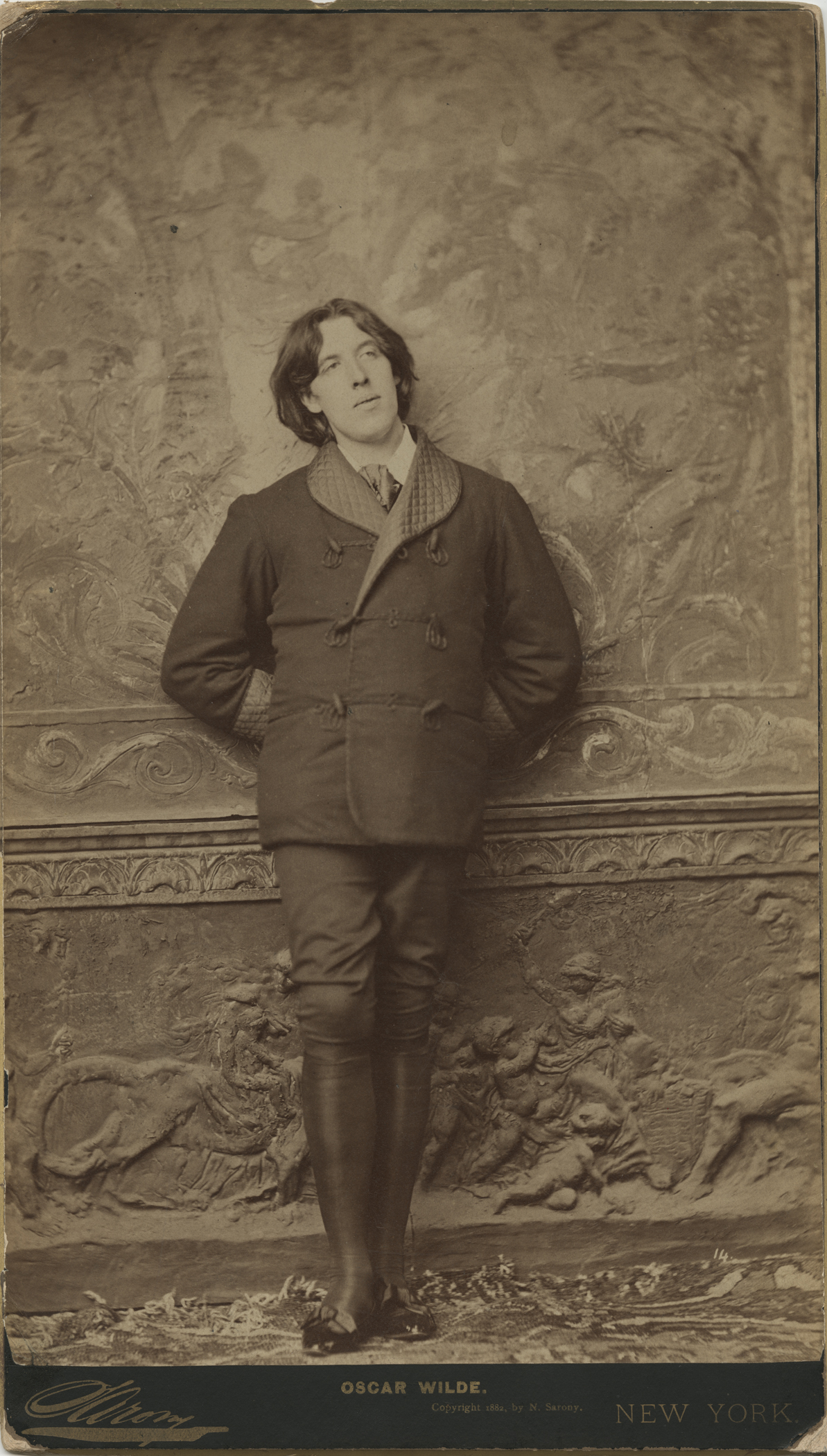
photograph by Napoleon Sarony. New York City, January, 1882
from Oscar Wilde by Barbara Belford
Chapter 1
Lord of Life
There is nothing like youth. The middle-aged are mortgaged to Life. The old are in Life's lumber-room. But youth is the Lord of Life. Youth has a kingdom waiting for it. --A Woman of No Importance
Oscar Wilde's first public performance was in the drawing room of his Dublin home on Merrion Square, where the two-year-old entertained guests by reciting his name--Oscar Fingal O'Flahertie Wills Wilde--over and over. Savoring the vowels, trilling the fricatives, he gulped for air, chanting away, faster and faster like an intelligent windup toy, precocious, brazen, and insecure, until applause quieted him. Wilde was later to assert: "Everyone is good until they learn to talk." His mother called him a genius, and he agreed but others misunderstood. "The public is wonderfully tolerant," Wilde said. "It forgives everything except genius."
He mocked himself and society and made the world laugh at destiny. "My name has two O's, two F's and two W's," he later observed. "A name which is destined to be in everybody's mouth must not be too long; besides it becomes so expensive in the advertisement." Following his birth, Wilde's mother wrote a friend: "He is to be called Oscar Fingal Wilde. Is not that grand, misty and Ossianic?" "Names are everything," says Lord Henry Wotton in The Picture of Dorian Gray, and Oscar, who believed that his cradle was rocked by fate, had more than his share.
"I envy those men who become mythological while still living," W. B. Yeats once remarked to Wilde, who replied, "I think a man should invent his own myth." That he did. The name Oscar was an auspicious beginning, for it honored the son of Osin of the Gaelic epics, who was born in the Land of Eternal Youth. Like his namesake, Wilde loved youth, even more than art. "The soul is born old but grows young," he wrote. "That is the comedy of life. And the body is born young and grows old. That is life's tragedy." Fingal, Gaelic for "fair-haired stranger," goes back to Viking times and identifies a coastal region between the Liffey and Boyne Rivers.
With the addition of O'Flahertie, recalling the Galway heritage of his father, whose ancestors had married into the clan of the pre-Norman kings of West Connacht, Oscar was linked to an ancient Celtic family. His father had been given the name Wills as a tribute to a leading Roscommon family that included the playwright William Gorman Wills. In fact, Wilde's father dedicated his first book, Madeira, to Wills, a notable eccentric who filled his room with abandoned animals he rescued. The name Wills was passed on to Oscar, who used it when it suited his fancy.
His mother called him Oscar, with an imperious accented a; his relatives preferred "Ossie." At public school he was "Grey-Crow," and at Oxford "Hosky" or occasionally "O'Flighty." In London, the American artist James Whistler dubbed him "Oscarino." Henry James referred to him as "Hoscar." Identity begins--and sometimes ends--with nicknames.
"How ridiculous of you to suppose that anyone, least of all my dear mother, would christen me 'plain Oscar,' " Wilde later said. "When one is unknown, a number of Christian names are useful, perhaps needful. As one becomes famous, one sheds some of them...I started as Oscar Fingal O'Flahertie Wills Wilde. All but two of the five names have already been thrown overboard. Soon I shall discard another and be known simply as 'The Wilde' or 'The Oscar.' "
Brilliance and daring created "The Oscar," which led to C.3.3., his prison cell number, and finally to Sebastian Melmoth, his nom de plume in exile, when, without an identity, Wilde was deprived of his currency in everyday life. Before his death, he decided that he wanted to be known as "the infamous St. Oscar of Oxford, Poet and Martyr." How far had he traveled from those jovial evenings when grown-ups applauded his recitations!
His parents were brilliant and eccentric--bohemian characters often manipulated by biographers into the cause of Wilde's errant sexuality. Far more than the sum of their excesses, they lived in the next century while other mid-Victorians still grappled with industrialism. William Wilde became a notable eye-and-ear surgeon with a still-resonating legacy of scientific and folkloric research. He fathered at least three illegitimate children before marriage and was accused of rape after marriage. His wife, an inflammatory poet of nationalism and innovative translator, became Dublin's most gossiped about hostess--known for her decadent bejeweled dresses and bawdy talk.
"Man is least himself when he talks in his own person," Wilde wrote in The Critic as Artist. "Give him a mask, and he will tell you the truth." In the art of masks, Wilde's mother was a skillful teacher. Jane Francesca Elgee was born on December 21, 1821. Births were not registered then, but she gave this date in 1888, when she applied for financial aid from the Royal Literary Fund and it was in her interest to be older. At other times she was five years younger. In A Woman of No Importance, Lord Illingworth speaks for her when he says, "One should never trust a woman who tells one her real age. A woman who would tell one that would tell one anything." Oscar started to grow backwards before he reached twenty-four, and by the time of his trials, when he was forty-one, he admitted to thirty-nine.